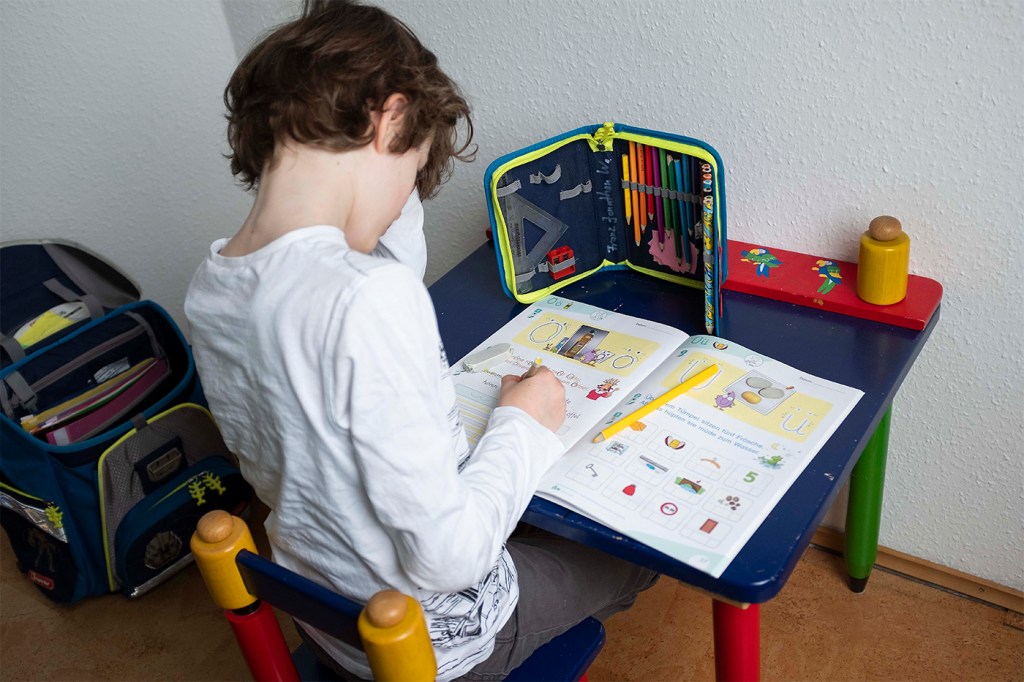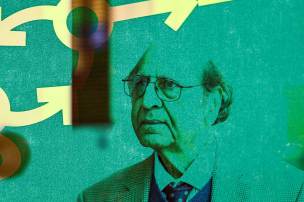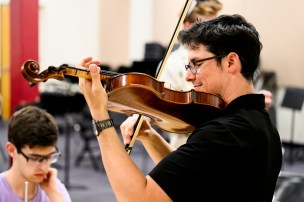Published on
Older adult tutors help kindergartners develop reading skills in Northeastern program inspired by early literacy losses
A new online intergenerational tutoring program for early literacy development created by Northeastern psychologists helps kindergartners and retired elders build meaningful relationships over Zoom.

A new tutoring program designed at Northeastern University taps into an underused resource to provide early literacy support to kindergarten students at low cost.
When the COVID-19 pandemic shut down schools in 2020, Jessica Hoffman watched her two younger children, who were in kindergarten and the first grade at the time, struggle with learning how to read.
Hoffman, professor in the department of applied psychology at Northeastern, a certified school psychologist and a licensed psychologist, recognized that her own children as well as others needed additional individualized instruction to address the learning gap.
Hoffman discussed ideas for an intervention with her Northeastern colleagues Robert Volpe, chair of the Department of Applied Psychology, and professors Robin Codding and Amy Briesch, all of whom specialize in school psychology.
“All of us are experts in school-based interventions,” Hoffman says. “We were all really concerned about the impacts of the school closures on kids’ academic development, their social, emotional and physical development.”
Hoffman also enlisted her husband, Edward Miller, an expert in gerontology and chair of the department of Gerontology at the University of Massachusetts Boston. They both recognized that older retired adults needed to stay active and socially involved—especially while isolated during the pandemic—to stay sharp, elevate their mood and ward off possible depression.
Thus, two teams from two universities set out to work on what is now called the Online Intergenerational Tutoring Program.

“It’s a win for the kids, for the older adult tutors, for the schools (to have increased resources from the community) and for the parents,” Hoffman says.
The pilot framework of the program was ready in the winter of 2021. The researchers partnered with the Malden Public Schools in Malden, Massachusetts, during the 2021-2022 and 2022-2023 school years to test the program and study its benefits both for children and adults.
The program paired kindergarten students struggling with early literacy skills with retired older adult tutors for supplementary after-school individual lessons via Zoom.
Sessions occurred three to four times per week, Hoffman says, over six to eight weeks for 30 minutes. Each child received 24 sessions.
The participating students were referred to the program by their kindergarten teachers after early literacy screenings conducted in the beginning of the school year.
Most students, Hoffman says, spoke languages other than English at home. Their parents were asked to sit near the children in case they needed help with solving technical issues or focusing and paying attention.
“As an added benefit, some parents developed their own English language skills as a function of just observing what their child was doing with their tutor,” Hoffman says.
Retired adults, mostly without professional training in education, were recruited from the University of Massachusetts Boston’s Osher Lifelong Learning Institute. They learned evidence-based instructional strategies to help children develop their reading skills during a group training and individual sessions with the Northeastern team.
Tutors used a variety of engaging activities to teach students letter sounds, using Tutoring Buddy—an online program developed by Volpe in the mid-2000s that uses incremental rehearsal and requires adult facilitation to create interactive experience.
The program starts off with an assessment showing students one letter at a time on the screen in a random order. Next, the program creates a lesson based on the assessment data. During the lesson, the child is presented with strings of letters on two lines using four letters from the assessment that the child vocalized correctly and two letters from the assessment that were pronounced incorrectly. The child is asked to say each letter sound scanning from left to right and the tutor provides feedback along the way.
“They are given this ratio of more [letters] that they know than that they don’t know in order to build confidence, to reduce frustration and to help them feel successful,” Hoffman says.
By learning small amounts of information at a time and practicing various early building blocks of literacy, she says, children improved their fluency of blending the letters sounds into words.
During sessions, tutors also applied the dialogic reading approach, reading online books together with the child and engaging them in a conversation about the stories. The adults asked questions and listened to responses, helping the child become a storyteller.
“Dialogic reading helps children develop their vocabulary and their language,” Hoffman says.
Children also grow their background knowledge, or understanding of the world around them, which is very important for comprehension as well.
Tracking 32 students over the course of two years, researchers were able to measure how their literacy skills improved in comparison to students who did not participate in the intervention. They predictably saw improvement in different skills, but statistically significant levels of difference occurred specifically in letter sound fluency and nonsense word fluency which, Hoffman says, are two predictors of reading success.
Overall, the program showed success both in terms of the literacy skills development in children and in terms of the impact of this experience on older adults—how meaningful it was to them to be able to develop the relationship with the child.
“About half of the tutors were retired older adults who live at home alone,” Hoffman says. “And they have been able to develop really beautiful relationships with kids. One of the coolest findings from this project is that the relationships extend beyond the 24 tutoring sessions that are in the program.”
In many instances, tutors asked the researchers for permission to keep working with the children or parents asked to extend the tutoring program.
It’s a win for the kids, for the older adult tutors, for the schools (to have increased resources from the community) and for the parents.
Jessica Hoffman, professor in the department of applied psychology at Northeastern
Nina Oast, 73, of Winchester Massachusetts, continues to meet with her student, a 6-year-old girl, once a week.
“I call her my Zoom pal,” Oast says. “We enjoy each other so much that we want to continue to see each other on Zoom.”
Oast, a retired computer systems architecture consultant and an angel investor, says she loves talking to children and has been looking for ways to engage with younger generations. A friend from the Osher Lifelong Learning Institute told her about this tutoring opportunity.
When they started their sessions, the girl was very shy and would only speak Chinese at home, Oast says. Although Oast grew up in Hong Kong and could communicate with the girl’s parents and grandparents, she told the girl she would only speak English to her.
Eventually, the girl opened up a lot and, by the end of the program, began to read the material herself, instead of Oast reading it to her.
“It feels rewarding watching some young person learn,” Oast says. “It brightens my day at least for half an hour.”
Marion Kade, 72, a retired special education elementary school teacher, says tutoring does require a big commitment on the tutor’s part. Pre-reading the materials, planning the lessons and evaluating how they went all take additional time, besides the sessions themselves. It took her a little bit to get used to the technology, but she says it’s all good for the brain.
Kade tutored three students over the course of two years.
“Each kid is very different,” she says.
To connect to the children, Kade says, she would ask them about school-related things. She also engaged children with songs, in addition to the program’s curriculum. This especially helped a Chinese boy who had just moved to the U.S. several months ago.
Kade worked with the boy on vocabulary in addition to the reading fluency.
“He is really bright,” Kade says. “He loved the stories. They’re picture books. So, he extrapolated so much information from the pictures that it blew me away.”
Kade also finds teaching children to read very rewarding.
“That’s a gift that no one can take away,” she says. “And then the relationships are really important, too.”
A significant advantage of the online intergenerational program, Hoffman says, is that volunteer tutors and inexpensive technology used for instruction make it low-cost.
“The only cost to running the program is having a program manager,” she says. “Now, we’re at a point where we’re hoping to obtain more funding to make the program sustainable and to grow it.”
The researchers are willing to share the tools with others who are interested in implementing this program on their own. They have developed a step-by-step manual, Hoffman says, and are happy to provide technical assistance. Moreover, the developed framework can be used for other programs focused on higher level literacy, math or other academic subjects.
As for her own children, they are making progress, Hoffman says.
“They were already beyond kindergarten, but I did use the strategies with them,” she says.
Alena Kuzub is a Northeastern Global News reporter. Email her at a.kuzub@northeastern.edu. Follow her on Twitter @AlenaKuzub





